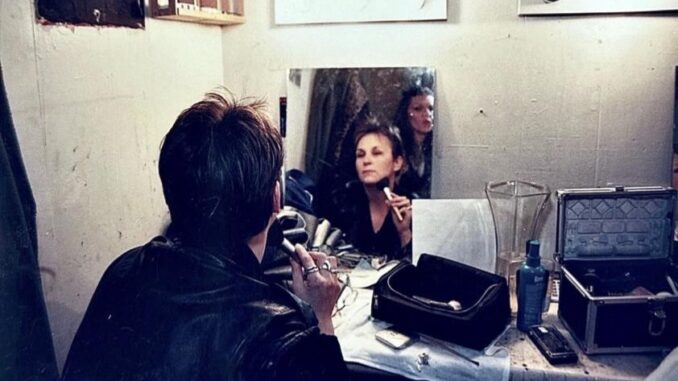
The first article in a new occasional series that will take a look at significant anniversary re-releases of iconic albums as they are put out.
Happy 25th anniversary to Mary Gauthier upon the re-release of her sophomore album, “Drag Queens & Limousines” on the Kill Rock Stars label. At AMERICANAFEST in Nashville this past September, Mary and a bunch of her friends partied like it was 1999 during an All-Star tribute to the singer/songwriter, who has kept getting better and better on her seven subsequent albums.

“In retrospect, I believe these were the songs that helped me find my writer’s voice”, Gauthier imparted. “My characters, like me, were on the edge, but they were also on the verge. People cracked, crumbled, and burned as they tried to deal with the everyday dramas of love vs. lovelessness, community vs. loneliness, and despair vs. faith. I was learning about sobriety, humility, and about how a brutal crack in the ego could become a lifesaving gift. Many of these songs remain on my set list today”.
There is so much intimacy on this record, it’s a contagious, honest reflection of Gauthier’s life during the time she was running a restaurant in Boston and pondering launching a career in music as she edged closer to 40 years of age. Coming of age as a gay kid in the Deep South (Louisiana) who had a difficult relationship to say the least with her mom, she found acceptance among those who, like her, were outsiders – artists, gays, the rebels, hippies, bikers, punks and misfits that took her in after being unceremoniously tossed out by her parents. “They became my patchwork family of choice,” she recalled.
There is something rewarding about hearing the details of a queer songwriter’s interior life, especially when intergenerational healing is not an option. Gauthier delivers all the details through a graceful reckoning.
“The song ‘Drag Queens in Limousines’ speaks to the outsider in everyone, Gauthier conveyed, “though I had no idea when I wrote it that people from all over the world, from all walks of life would relate to it. Turns out, high school was hard for a lot of folks, not just the gay kids. In Texas, I look out from the stage and see cowboys singing along. In Aberdeen, a middle-aged lorry driver pumped his fists: ‘Show us yer heart Mary!’ In Cork the whole pub knows the words and joyfully sings with me”.
The fourth song on the album is ‘I Drink,’ a distressing self-portrait of a young runaway who develops an addiction to alcohol. Gauthier checked in to her first drug and alcohol treatment center at 15, and spent her 16th birthday locked inside a place with an onerous name: The Baton Rouge Adolescent Chemical Dependency Unit. Recalling this sobering tale, Gauthier said: “I became an addict early on, and full on. I tend to think I was born this way. I have no memory of ever taking a “social” drink.” She has said the song is only “semi-autobiographical,” written from the male perspective of a father who would “get home at 5:30 / fix his drink And sit down in his chair / Pick a fight with mama / Complain about us kids getting in his hair”.
Gauthier switched from personalization to the country-inflected story of a little Texas girl (‘Karla Faye’) convicted of murder. There’s not much hope in her execution – “A little girl lost / a world full of pain / He said it feels good / so she gave him her vein”.
‘Evangeline’ is the story of the socially unacceptable, a dancer in what we assume is

a topless bar and her lover who is sexually obsessed with her “She moves, I can’t stop watching / The dirty stage, it’s her home / And on my skin her touch lingers / And it’s worse than bein’ alone”. The poetic voice in ‘Our Lady of the Shooting Stars’ toes the blurred line between joy and melancholy. The title comes from “The Secret Life of Bees”, a novel by Sue Monk Kidd, which delves into the story of a 14-year-old white girl who is haunted by the memory of the afternoon her mother was killed. She is eventually taken in by an eccentric trio of sisters who are beekeepers. The song is reminiscent in a way of Dylan’s ‘Shooting Star’, which also speaks of a young girl trying to find a new way in life. Gauthier’s narrator is searching for a girl she wants to join in flight.
The one song that could be loosely termed uptempo on the album is ‘Different Kind of Gone’. It’s another stab at the difficulties of being in love with someone when you’re not sure you like the person you’re becoming “It kills you that I disappeared /after we made love all those nights in a row”. Whether the narrator’s troubles are due to drink or a lack of courage to embrace a lover is up for question. Again, it’s about women portraying themselves as complex people who find the vagaries of life to be overbearing. As Gauthier posits, “Who in their right mind starts a career in music at age 40? In my heart of hearts, I knew I had to try …. And somehow, it worked.” Some say you have your entire life to write your first record. In this case, it was her second record and only took half her life.
Usually, it’s her acoustic guitar coupled with some harmonica fills rekindling Dylan’s early years. Her voice also echoes Dylan, low and gravely and charged with emotion. There is so much intimacy among the loss on this album, a contagious and honest reflection of the obstacles and frustration that is part of relationship territory. Two poignant love songs, softly intoned, reveal such struggles. ‘Slip of the Tongue’ is about saying something you don’t mean – or maybe you do but should have kept silent – “Honey sit down / I’ve got something to say / Last night I drowned / I got carried away”. And a similar impasse is reached in one of the best songs on the album, ‘Lucky Stars,’ which brings to mind Linda Ronstadt’s maudlin ‘Long, Long Time.’ – “The truth is hard to know / so we go with points of view / now I count my lucky stars / (I used to count on you)”.
 Gauthier once described her music as country noir, frank and unvarnished songs from the perspective of society’s misfits and outcasts that plumb emotional bareness found at the core of country music. “Drag Queens & Limousines” is such a deeply earnest, empathetic and personal album that captures exactly what she must have been experiencing between the ages of 15 and 40. The album isn’t solely about celebrating people of marginalized genders who are expressing themselves in ways that go well beyond themselves as objects. It has endured these 25 years as an expression of clarity, tending to the comforts and hardships of love as old as the ages.
Gauthier once described her music as country noir, frank and unvarnished songs from the perspective of society’s misfits and outcasts that plumb emotional bareness found at the core of country music. “Drag Queens & Limousines” is such a deeply earnest, empathetic and personal album that captures exactly what she must have been experiencing between the ages of 15 and 40. The album isn’t solely about celebrating people of marginalized genders who are expressing themselves in ways that go well beyond themselves as objects. It has endured these 25 years as an expression of clarity, tending to the comforts and hardships of love as old as the ages.
In a literal sense, though, it describes friendship and seeking solace and sympathy from others on the margins of polite society. Gauthier developed the idea for “Drag Queens in Limousines” when her friends took her out to a diner outside Times Square in NYC to cheer her up after a failed gig that no one attended. She recalled the occasion on a Facebook post. “As we walked in, I noticed that the parking lot was filled with limos, shiny black cars that wrapped around the front and both sides of the building. We made our way in and got our menus. As I sat there brooding, a door swung open and two drag queens in full female makeup, high heels, sparkly dresses and big, big hair strutted in talking loudly and laughing in that loud drag-queen look-at-me-kind-of-way. They ordered coffees to-go, then, poof, they were gone. All that was left when the door swung shut was the sweet smell of their perfume. I looked at my friends in amazement. They smiled and nodded, “We love it here. Isn’t it great, Drag Queens and Limousines!”



Great piece – Mary Gauthier is important because she offers a unique voice, and although you don’t quite say it she’s as deserving of the New Dylan tag as anyone!
I agree. The thing I found out about her, when I saw her (first time) this year, is how funny she is. Remarkable considering the tone and content of her songs